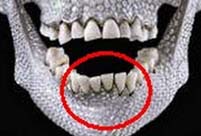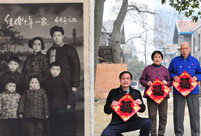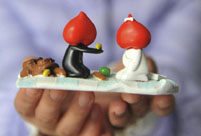 Amazing cliff diving in cold winter
Amazing cliff diving in cold winter
 Enjoy Sochi 2014 in slow motion
Enjoy Sochi 2014 in slow motion
 University student sentenced to death for poisoning roommate
University student sentenced to death for poisoning roommate
 Chinese lunar New Year celebrated in San Francisco
Chinese lunar New Year celebrated in San Francisco
 Taiwan Lantern Festival 2014
Taiwan Lantern Festival 2014
 Haiyang Yangge: make up
Haiyang Yangge: make up
 China's top 10 richest cities
China's top 10 richest cities
 President Xi visits garrison troops in Inner Mongolia
President Xi visits garrison troops in Inner Mongolia
 Turnip sculptures amaze tourists in Qingdao
Turnip sculptures amaze tourists in QingdaoKIEV, Feb. 20 -- "My city has turned into a battleground. I am very afraid, as it reminds me of the stories of my parents about the war," said Inga Frolova, a native Kiev citizen, who lives not far away from the city center, the main site of the ongoing protests.
The 47-year-old lady, who has a serious heart disease, claimed that her health has deteriorated over the violence in the country.
"I can not sleep at night because of emotional stress. I can not even go to the pharmacy to buy medicine, because transportation in Kiev is paralyzed," she told Xinhua.
"If I have a heart attack, I wonder if an ambulance could arrive quickly. Almost all of the doctors are busy with treating the victims of the conflict."
The violent clashes between Ukrainian riot police and protesters, which unexpectedly resumed in Kiev on Feb. 18, have so far claimed at least 35 lives and left hundreds of others injured.
"We are working almost round-the-clock. Patients lie even in the corridors of the hospitals. After working for 15 years as a doctor, I've never seen so many wounded," said therapist Valentina, who prefers not to give her last name.
One of the hurt in the clashes, the 22-year-old student Taras, who suffered shrapnel wound after a stun grenade exploded not far from him, said that he does not regret that he had participated in the protests.
"I am risking my life for the sake of every Ukrainian to fight against corruption and banditry in my country," Taras said.
Alongside Taras, tens of thousands of Ukrainians joined the protests. Not only students, but also teachers, businessmen and office workers changed their white shirts and polished shoes to camouflaged down-padded coats, flak jackets and ankle boots.
Yet, not all Ukrainians support the demonstrators.
"Why the protesters have decided that they are representatives of the Ukrainian people? I am also a part of the nation, but I strongly object their actions. I can not get to work because the subway system is not functioning. I am afraid of being fired and I need this job to feed my daughter," said Inna Alexandrova, a restaurant accountant.
The subway system in the Ukrainian capital, which carries around 2 million passengers every day, was closed on Tuesday over a terror threat, triggering a transport disaster for the city, where some 4 million people live.
In addition, the protesters are blocking entry roads to Kiev to ward off riot police.
Traffic police also set up roadblocks to check vehicles entering the capital for explosives, weapons and other dangerous objects.
Those measures have created much inconvenience to ordinary citizens, especially to truck drivers.
Valeriy, who transports goods from western Ukraine to the capital through the international highway Kiev-Chop, was outraged by the road checks.
"For the last 24 hours, I drove little more than 300 kilometers. My vehicle was checked at entrances to each city," Valeriy told Xinhua.
While violence in central Kiev continued, local residents fearing that food stuff will disappear from stores due to transport collapse started hoarding necessities.
"People began to buy more cereals, pasta, meat, canned food, drinking water and matches," said Elena Shcreben, a salesman at a small shop in one of the bedroom communities in Kiev.
Sasha, a member of Ukrainian Berkut, a special force, said in broken English that he was disappointed about some Western reporters.
"They just (say) good things for them (protesters), and (accuse) us (of being) violent," he said. "They (are) not true."
Having been stationed around the Independence Square for the third consecutive day, Vladimir, another policeman wearing a wedding ring, said he wanted to go home.
"But (I) don't know when," he said.
 Most gorgeous female celebs in Chi-pao
Most gorgeous female celebs in Chi-pao Second round of test kicks off at Beijing Film Academy
Second round of test kicks off at Beijing Film Academy Ancient Qiang people had vertically grown teeth
Ancient Qiang people had vertically grown teeth Top 10 Chinese youth’s favorite seaside destinations
Top 10 Chinese youth’s favorite seaside destinations Traditional Tibetan clothing tailors
Traditional Tibetan clothing tailors In photos: Unveiling Taishan station
In photos: Unveiling Taishan station Beautiful moments of family reunion
Beautiful moments of family reunion 10 Valentine's Day ideas for couples
10 Valentine's Day ideas for couples Let's get married today!
Let's get married today! Chinese warplanes C919 to appear at Singapore Airshow 2014
Chinese warplanes C919 to appear at Singapore Airshow 2014 Ruins of Shang Dynasty's structure unearthed in Shaanxi
Ruins of Shang Dynasty's structure unearthed in Shaanxi  Intercity high speed train in operation
Intercity high speed train in operation Severe coldness freezes large parts of China
Severe coldness freezes large parts of China  Beautiful moments of Sochi
Beautiful moments of Sochi  It's not just performing this year
It's not just performing this yearDay|Week|Month